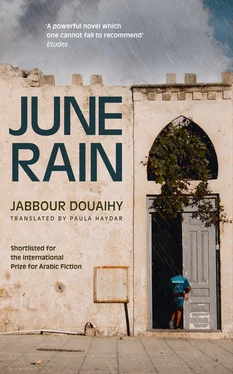And Muntaha also comes along, as she does every day, at sunrise. She, too, locks the door to her house with two turns of the key and takes the key with her. She doesn’t dare leave the door wide open anymore the way she used to. In those days she’d even prop the door open with a chair to prevent the wind from slamming it shut. From the day she was born she’d been used to leaving the door open. Nowadays she is afraid of being robbed. Every day she hears about another incident. Skilled burglars came into people’s houses while they slept, crept into their bedrooms and stole all their jewellery out of the drawer right over the head of the man lying there asleep beside his wife. So far, no one had yet to wake up in the midst of the robbery. No doubt the thieves sprinkled some chloroform in the house they were robbing, which is why the people being robbed woke up in the morning feeling tired and groggy. Muntaha believed there had come to be more strangers living in the town than natives.
‘We don’t know anyone anymore. Where are they all coming from?’ she’d say, looking them right in the face.
Usually when Muntaha came over to Kamileh’s balcony she brought along with her a tray of lentils to sift through, to pick out the pieces of straw and the little pebbles, or she’d bring a batch of courgettes to core with ease and skill. If the lunch menu was an easy one to prepare, she’d just bring along her knitting — a navy blue sweater, for herself.
Muntaha doesn’t have anyone left to knit a sweater or scarf for. Her brother married and went abroad, but he taught his children to remember their aunt, all the way from Australia. She doesn’t know them but they always sent her their greetings and holiday cards in the mail and some money they managed to save up from the meagre salaries they earned from their humble work in the factory. She loves them. She doesn’t have anyone else to love but them, but she has never seen them except in pictures. After her mother died, the mute hadn’t lasted long. He went down to the river one Sunday morning to fish for eels as usual and never came back. They searched everywhere for him; he completely vanished. Maybe he had been sucked into the river. Muntaha has no one left to knit for, so she knits for herself — things she never wears. If anyone asked her about her knitting, she’d say she was finishing a sweater for the neighbours’ little boy in time for the start of school, as if it was shameful for a woman to knit for herself.
But today she comes empty-handed. She makes sure to wear her best dress — the dark brown one. They sit side by side. If Muntaha speaks, Kamileh responds — in brief.
The day heats up and sounds fill the air. Kamileh hushes whoever she can so Eliyya can sleep. She knows who makes every nearby sound and after every noise she scolds whoever caused it.
Around ten Eliyya comes out to the balcony, dressed in a fine white suit. He squeezes into the seat beside Kamileh. He kisses her on the forehead, goes overboard with kisses, wraps his arms around her, and she pushes him away. He insists and she insists back. She doesn’t want these kinds of emotional antics. She can’t stand them. He opens the notebook that never leaves his side, writes something down and then places it beside him on the seat.
Two boys poke their heads between the plants on the balcony, like two people poking their heads between the curtains to watch a play. They climb the wall between the balcony and the main road with agility. Their eyes burn with a desire to see. They stand on tiptoes to get a full view of the scene. News still travels door to door in the Gang Quarter, just like it did in the old days. News of murder and revenge preceded people’s news. It spread among the townspeople from mouth to ear, skipping the strangers Muntaha was so afraid of. It skipped them, waiting until they became integrated into the community. The news that has been travelling door to door since the night before and which the children heard along with stern words from their parents, is that Kamileh’s son, the son of Yusef al-Kfoury who was killed in the Burj al-Hawa incident, is returning to America today, and after today, his mother will never see him again.
Today the schools are on strike and the kids won’t be going to school. Unexpected days off have a special flavour to them. When they heard their parents talking about Kamileh’s son’s travel plans, they said to themselves, ‘There’s a strike tomorrow. Let’s go watch.’
The two boys poke their heads between the plants on the balcony, waiting for the goodbyes. It wasn’t clear who had added to the news bulletin the notion that Kamileh wouldn’t see her son again after today. The two youngsters rushed to watch the moment of final farewell. The idea that Kamileh will never see her son again is what attracts them. They want to see what a last goodbye looks like, one that will never be followed by a reunion. He will never come back to Lebanon after that day and soon she is going to die.
Some of their other friends also join the two boys, and a little while later a crowd of schoolchildren from the First Public High School for Boys surrounds Kamileh’s balcony from all directions. And other classmates who sat beside them on the desk benches at school also join in — little children, sons of the strangers who’d recently taken up residence in the Gang Quarter. Muntaha tries to shoo them away. They back off for a little while but stubbornly stick around in the area. If they back off a few metres, it is only to inevitably return a few minutes later. They follow every movement; they watch as Eliyya and his mother whisper back and forth. Eliyya hesitates a bit, looks around, acknowledges the others present, smiles and gets up to go into the house.
He comes out a little later with his instrument strapped to him. He bends over it wiping off the dust and rediscovering the keys. The children come closer; the appearance of the accordion is a signal to them to creep closer and closer. Some of them have the courage to jump over the balcony railing and sit on the floor beside the family members and the neighbours who’ve come to share in Kamileh’s farewell to her son. He hits one note and then two notes after that, making sure the instrument still makes sounds. He smiles. The number of onlookers multiplies as they call to one another in the narrow alleyways. The entire Gang Quarter.
He turns to face them. He plays the tunes for them that he still remembers after all those years, and they stare at him, silent and breathless. They watch his every move as he stretches the accordion as far as it will open, the whole length of his arms. They enjoy the way it stretches open like that. He opens it only to squeeze it back all the way shut. He probably hasn’t picked up the accordion the whole time he’s been abroad, but the moment he starts pressing the keys his ability to play comes back to him, like when you get back on a bicycle. You learn once and never forget. Without putting on airs, he leans over his accordion and shuts his eyes as if suffering some sort of pain along with the sad tune emanating from it; or he taps his feet in joy when the tempo and rhythm speed up, and sways side to side. He plays whatever tunes come to mind until Kamileh requests ‘ Zoorooni Kulli Sana Marra ’ — Visit Me Once a Year — which he plays, looking directly into the eyes of the children mesmerised by his deft fingers flying over the keys. They watch him play without listening to the music he is belting out of that amazing instrument of his. The moment Eliyya begins to play, a strange silence comes over the neighbourhood; all car movements seem to come to a complete stop and one no longer hears the sound of mothers calling their sons, or doors slamming, or dogs barking anywhere around.
When Eliyya starts to show signs of tiring, even though he continues to smile for his audience, Muntaha asks the neighbourhood children to leave, explaining that the woman wants to say goodbye to her son and they should all go play around their own mothers. Muntaha doesn’t have any other way of saying it. But they aren’t going to budge one iota. They are going to watch the scene to the very end. Muntaha threatens to go inside to the living room and even begins to ask Kamileh, Eliyya and their visitors to move inside, but the neighbourhood kids raise their voices in protest.
Читать дальше












